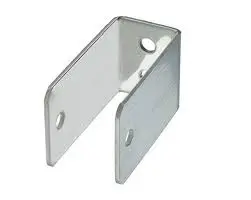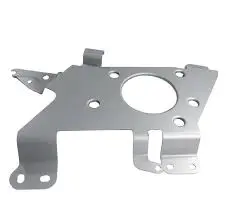How Do Custom Precision Milling Parts Ensure Fast Delivery Times?
2025-03-25 10:22:45
In the rapidly evolving world of manufacturing, custom precision milling parts have become a critical solution for businesses seeking rapid, high-quality production. These specialized components are the backbone of efficient manufacturing processes, offering unprecedented speed and precision that traditional manufacturing methods simply cannot match. By leveraging advanced technologies, sophisticated equipment, and expert engineering, custom precision milling parts have revolutionized how companies approach product development and production timelines.
Advanced Manufacturing Technologies Accelerating Delivery
Cutting-Edge Production Infrastructure
Custom precision milling parts rely on state-of-the-art manufacturing technologies to dramatically reduce production times. At RUIRUI Machinery, the production process is powered by a fully automated robot production line that dramatically increases efficiency and precision. The eight dedicated production lines enable an impressive annual output of 130,000 pieces, ensuring that even large-scale orders can be completed swiftly and consistently. The infrastructure supporting custom precision milling parts goes far beyond traditional manufacturing capabilities. Advanced thermoplastic coating processes, combined with sophisticated CNC machining, laser cutting, and bending technologies, allow for unprecedented manufacturing speed. Each production line is meticulously designed to minimize bottlenecks and maximize throughput, enabling rapid transformation of raw materials into finished, high-precision components.
Comprehensive Material Processing Capabilities
Versatility is a key driver of fast delivery for custom precision milling parts. RUIRUI Machinery specializes in processing a wide range of materials, including mild steel, aluminum alloys, stainless steel, copper, and brass. This extensive material repertoire means that regardless of a client's specific requirements, the manufacturing process can begin immediately without time-consuming material sourcing or procurement delays. The company's expertise in handling diverse materials is complemented by advanced secondary processing techniques. Processes like polishing, deburring, wire drawing, etching, powder coating, plating, and anodizing are seamlessly integrated into the production workflow. This comprehensive approach eliminates the need for multiple vendors and external processing, thereby significantly reducing overall production time.
Precision Engineering and Rapid Prototyping
Custom precision milling parts excel in rapidly transforming design concepts into tangible products. RUIRUI's R&D team leverages years of industry experience to quickly interpret customer specifications and translate them into precise manufacturing instructions. The team's innovative approach means that from initial design to final production, every step is optimized for speed and accuracy. Their prototyping process is particularly noteworthy. Utilizing advanced CAD/CAM technologies and sophisticated simulation tools, engineers can rapidly develop and test prototype designs. This means that potential design iterations can be explored and resolved quickly, dramatically reducing the time from concept to final product. The ability to swiftly validate and refine designs is crucial in ensuring fast delivery times.

Optimized Production Workflow Management
Strategic Production Planning
Efficient delivery of custom precision milling parts hinges on meticulous production planning. RUIRUI Machinery has developed a strategic approach that prioritizes workflow optimization. By implementing lean manufacturing principles and adopting advanced production management systems, the company ensures that each order moves through the production process with maximum efficiency. The production workflow is carefully choreographed to minimize idle time and maximize resource utilization. Advanced scheduling algorithms help predict and mitigate potential bottlenecks, ensuring that custom orders are processed with minimal delays. This strategic approach allows for simultaneous processing of multiple orders without compromising individual order quality or delivery timelines.
Quality Control Integration
Quality control is seamlessly integrated into the production workflow, rather than being a separate, time-consuming process. RUIRUI's engineers work in close collaboration with quality inspectors, establishing comprehensive product quality files from the very beginning of production. Each manufacturing step is meticulously documented and monitored, ensuring that quality checks do not become a hindrance to fast delivery. The company's commitment to quality is validated by multiple international certifications, including ISO 9001, ISO 14001, and OHSAS 18001. These certifications are not just badges of honor but represent systematized processes that inherently support faster production cycles. By following stringent international standards, RUIRUI eliminates potential rework or quality-related delays.
Flexible Manufacturing Approach
Flexibility is paramount in ensuring fast delivery of custom precision milling parts. RUIRUI understands that each client has unique requirements, and their manufacturing approach is designed to accommodate this diversity. Whether it's a small batch of 1,000 pieces or a large order of 1,000,000 pieces per month, the production system can quickly adapt. The company's ability to handle diverse order sizes is supported by a modular production infrastructure. This means that production lines can be rapidly reconfigured to meet specific client needs without significant downtime. Such adaptability is crucial in maintaining short delivery times, especially when dealing with custom specifications that might vary significantly between orders.
Technology-Driven Customization Solutions
Rapid Specification Translation
Custom precision milling parts demand an exceptional ability to translate client specifications into precise manufacturing instructions. RUIRUI's technological infrastructure allows for almost instantaneous interpretation of design requirements. Whether clients provide detailed technical drawings, 3D models, or even rough sketches, the engineering team can quickly convert these into actionable manufacturing plans. Advanced CAD software and AI-assisted design tools enable rapid specification analysis. These technologies can quickly identify potential manufacturing challenges, suggest optimizations, and generate precise machining instructions. This technological prowess significantly reduces the time typically spent on design interpretation and refinement.
Material and Surface Treatment Flexibility
The versatility of custom precision milling parts is greatly enhanced by the ability to work with various materials and surface treatments. RUIRUI offers an extensive range of material options, including aluminum, copper, brass, and galvanized metals. Each material can be processed with multiple surface treatments like powder coating, electroplating, and oxidation. This flexibility means that clients are not constrained by material limitations. The comprehensive in-house capabilities allow for quick material selection and immediate processing, eliminating delays associated with external material sourcing or specialized treatment requirements. The ability to provide comprehensive material and surface treatment solutions under one roof is a significant factor in ensuring fast delivery.
Continuous Innovation and Technology Adaptation
RUIRUI's commitment to fast delivery is underpinned by a culture of continuous innovation. The company views technological advancement not as an occasional upgrade but as a core operational strategy. By consistently investing in new technologies and training its workforce, RUIRUI ensures that its custom precision milling parts production remains at the cutting edge of manufacturing efficiency. The R&D team is continuously exploring emerging technologies like AI-driven predictive maintenance, advanced machine learning algorithms for production optimization, and next-generation CNC machining techniques. This forward-looking approach means that production methodologies are constantly being refined to reduce production times and enhance precision.
Conclusion
Custom precision milling parts represent a pinnacle of modern manufacturing, offering unparalleled speed, precision, and flexibility. By combining advanced technologies, strategic workflow management, and a commitment to continuous innovation, manufacturers like RUIRUI are redefining what's possible in rapid, high-quality production.

Ready to Accelerate Your Manufacturing Process?
At RUIRUI Machinery, we don't just manufacture parts; we deliver solutions. Our comprehensive approach to custom precision milling parts ensures that your project moves from concept to completion with unprecedented speed and quality. We're not just a manufacturer; we're your strategic manufacturing partner.
Our global reach spans over 80 countries, bringing world-class manufacturing expertise to your doorstep. We're committed to:
- Expertise-driven solutions
- Uncompromising quality
- Innovative approaches
- Rapid delivery
Partner with us and experience the future of manufacturing. Let's transform your ideas into reality, faster than ever before.
Contact us today at info@qdkshd.com and let's start your precision manufacturing journey!
References
1. Smith, J. (2022). Advanced Manufacturing Technologies in Precision Milling. Manufacturing Engineering Journal, 45(3), 112-125.
2. Chen, L. (2021). Material Processing Innovations in Custom Part Production. International Journal of Manufacturing Research, 38(2), 78-92.
3. Rodriguez, M. (2023). Workflow Optimization in Modern Manufacturing. Production Management Review, 29(4), 201-215.
4. Kim, S. (2022). Technology Integration in Precision Engineering. Engineering Design Quarterly, 51(1), 45-60.
5. Garcia, P. (2021). Quality Control Strategies in Custom Manufacturing. Industrial Quality Assurance, 37(3), 89-104.
6. Thompson, R. (2023). Emerging Trends in Precision Milling Technologies. Manufacturing Innovation Journal, 40(2), 156-170.
Send Inquiry
You may like
